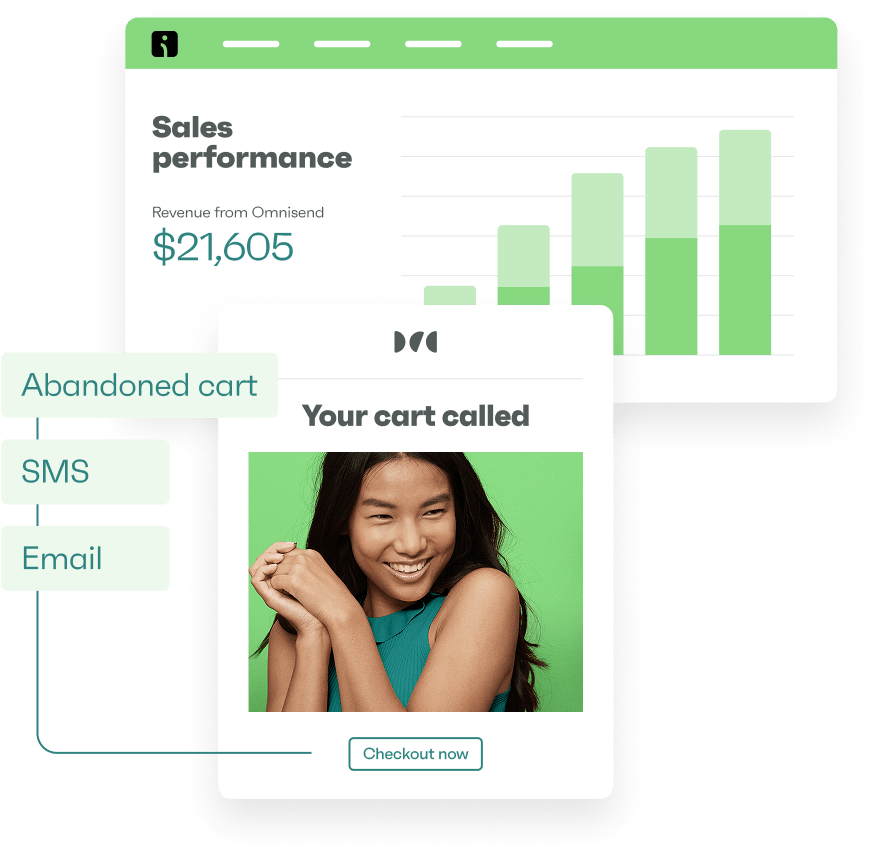Drive sales on autopilot with ecommerce-focused features
See FeaturesRead summarized version with
Shopify coupon codes are powerful, but if you’ve searched for guidance on creating and managing them, you’ve probably found the information scattered across multiple FAQs and help forums. That’s why this all-in-one guide pulls everything together, from the basics of setting up discounts to advanced automation with tools like Omnisend.
This resource will cover every type of Shopify discount, show you how to avoid common pitfalls, and explain how to use them to maximize your sales.
Creating Shopify coupon codes is the easy bit. The challenge lies in knowing which type to use, when, and how. But by the end of this comprehensive guide, you’ll know how to add a discount code on Shopify and have the confidence and strategies to become an expert in building promotions that convert.
Quick sign up | No credit card required
What is a Shopify coupon code?
A Shopify coupon code is a text string customers enter at checkout to receive a discount. You create these codes in your Shopify admin and share them to encourage sales.
You can offer coupons in two ways:
- Discount codes (manual): Customers type these at checkout. You control distribution via emails, ads, or influencer posts. Useful for tracking campaign performance — you’ll know how many sales came from that Instagram story. The downside is that people forget codes, mistype them, or abandon carts searching for them.
- Automatic discounts: These apply without any customer action. Set rules like “$10 off orders over $75” and Shopify handles everything. Customers see reduced prices instantly. They have higher uptake rates since there’s no extra step, but it’s harder to track which marketing channel drove the sale.
Both discount types work across your entire business — online store, physical retail with Shopify POS, and social commerce checkouts. You can always use both, so manual codes for campaigns and automatic discounts for general promotions.
What Shopify discount types can you create?
Shopify offers three native discount types. You can build basic promotions without installing apps, but complex coupons and discount emails require additional tools.
Amount off discounts (percentage or fixed value)
Cut prices by percentages or fixed amounts. “SAVE20” takes 20% off. “$10OFF” removes 10 dollars. Apply these to single products, collections, or entire orders.
Flash sales need time pressure — “48HOURS” creates weekend urgency. New customers respond to “WELCOME15” codes.
End-of-season inventory moves with “CLEARANCE50.” Minimum thresholds protect profits: “$5 off when you spend $50” maintains margins on smaller orders.
Buy X get Y (BOGO) discounts
With this discount pricing strategy, you set purchase requirements that trigger rewards. Buy two shirts, get the third free. Purchase a laptop, and receive 50% off any mouse. Match identical items (three socks for the price of two) or mix categories (jeans purchase includes a free belt).
Bestsellers help move stagnant inventory when paired strategically. Launch new products by bundling them at discounts with established favorites. Quantity caps prevent bulk buyers from exploiting your generosity.
Free shipping discounts
Eliminate delivery fees based on your rules. All orders ship free. Orders above $75 qualify. Certain products always include shipping. Exclude premium delivery options — standard shipping is free, but you can upgrade for next-day delivery.
Your cart and checkout abandonment rates will increase when shipping costs disappear, so display “Free shipping over $50” when average orders hit $45. Customers will add extra items to qualify, increasing order values naturally.
Comparison of native discount types
Check out this table for a snapshot comparison of each Shopify coupon code:
| Discount type | Best for | Example | Limitations |
|---|---|---|---|
| Amount off | General promotions | 20% off sitewide | Single-tier only |
| Buy X get Y | Bundle deals | Buy one get one free | One condition per discount |
| Free shipping | Reducing abandonment | Free over $75 | Static thresholds only |
Limitations and when to use apps
Native Shopify discounts handle basic scenarios but hit walls with advanced strategies. Here’s what you can’t do natively:
Discount stacking limitations
- Product and order discounts don’t combine (except for eligible stores)
- Maximum five Shopify discount codes per order
- Only one shipping discount allowed
- BOGO items can’t receive additional product discounts
Technical constraints
- 25 automatic discount limit (includes app discounts)
- No tiered pricing (10% off $50, 20% off $100, 30% off $200)
- No time-based flash sales or countdown timers
- No customer segment targeting (VIP vs. new customers)
- No minimum/maximum quantity limits per customer
When apps become essential
- Gift with purchase promotions
- Volume/wholesale pricing tables
- Loyalty point redemption at checkout
- Dynamic bundles with custom pricing
- Early access or member-only sales
- Geographic or demographic targeting
- Complex BOGO variations (buy two, get 50% off the third)
Shopify’s documentation explicitly states, “You can use an app to create a single discount that includes more than one discount saving.” So, it acknowledges its limitations and points you to its App Store.
Additional reading:
15 Shopify Plus apps to increase your sales
How to create a Shopify coupon code: A step-by-step guide
Creating a discount code for Shopify takes minutes when you know where to click. Follow these steps with your Shopify admin open in another tab.
Step 1: Navigate to Discounts
Open your Shopify admin dashboard. The Discounts option sits in the left sidebar menu — click to access your discount management area:
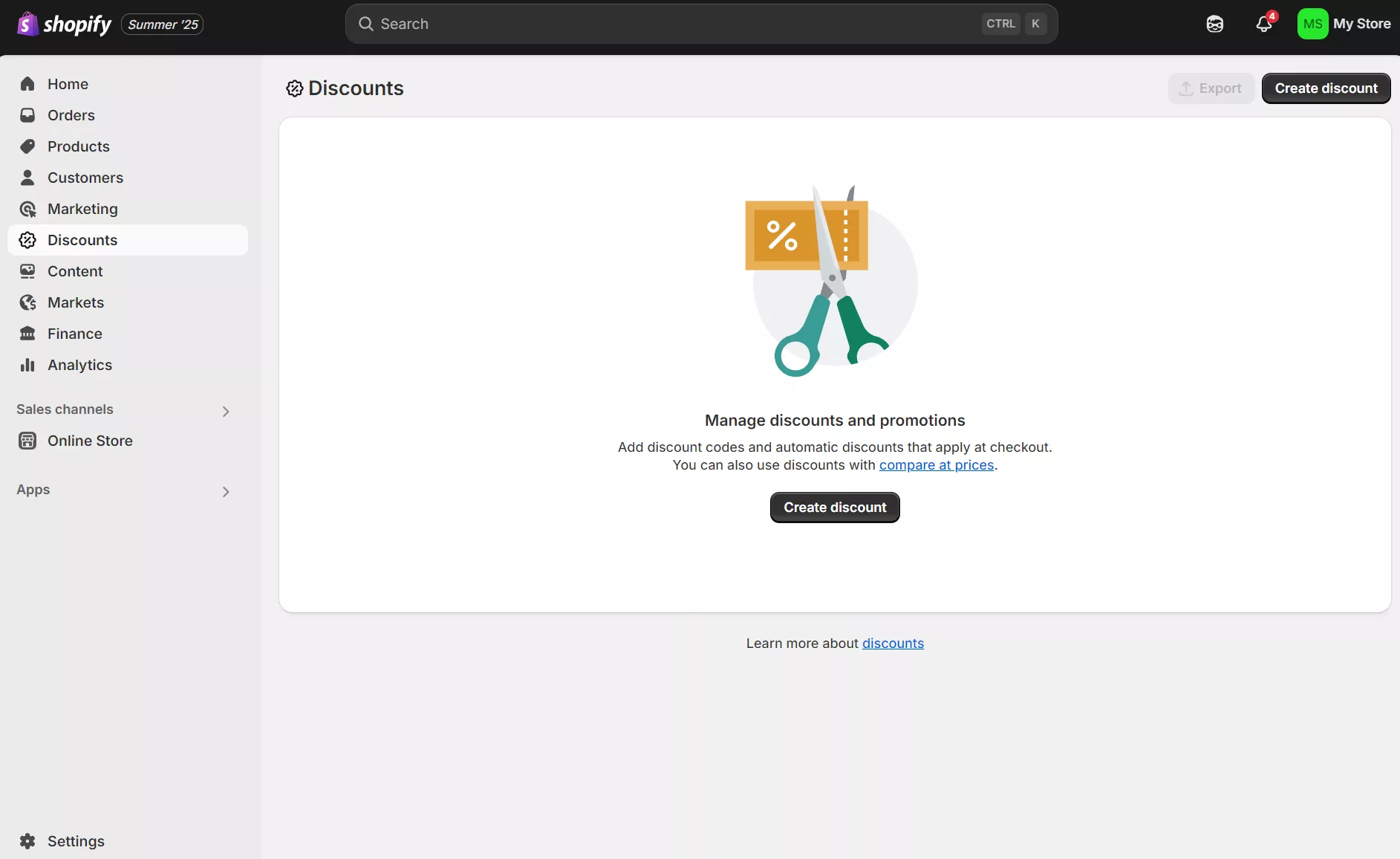
Step 2: Click “Create discount” and choose a type
Hit the Create discount button in the top right corner. A menu appears with four discount types:
- Amount off products — reduce prices on specific items
- Buy X get Y — BOGO and bundle deals
- Amount off order — discount entire purchases
- Free shipping — eliminate delivery costs
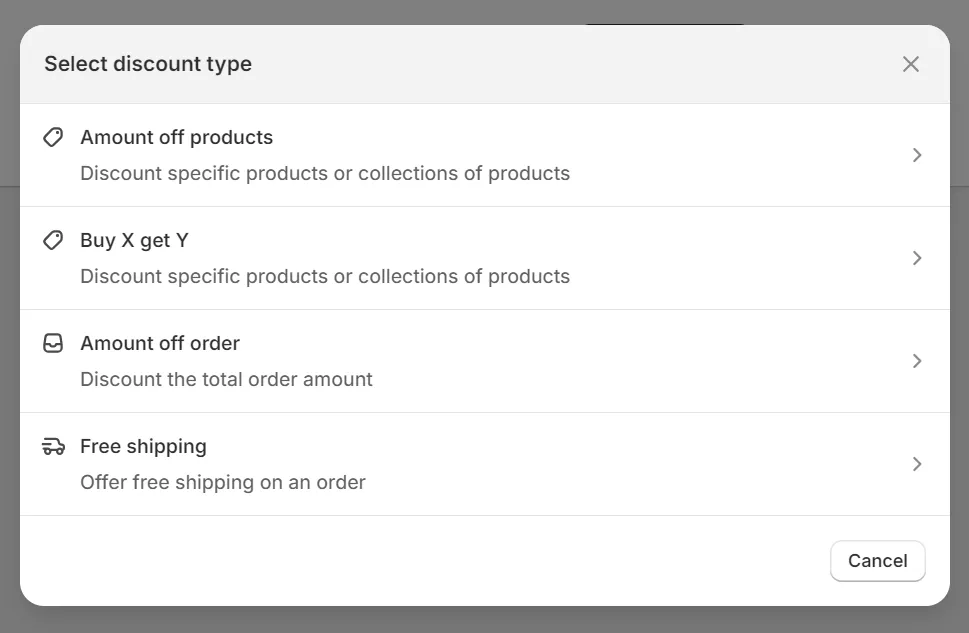
Select your preferred type. You will then be redirected to the Create discount settings page, where Discount code is preselected as the method:
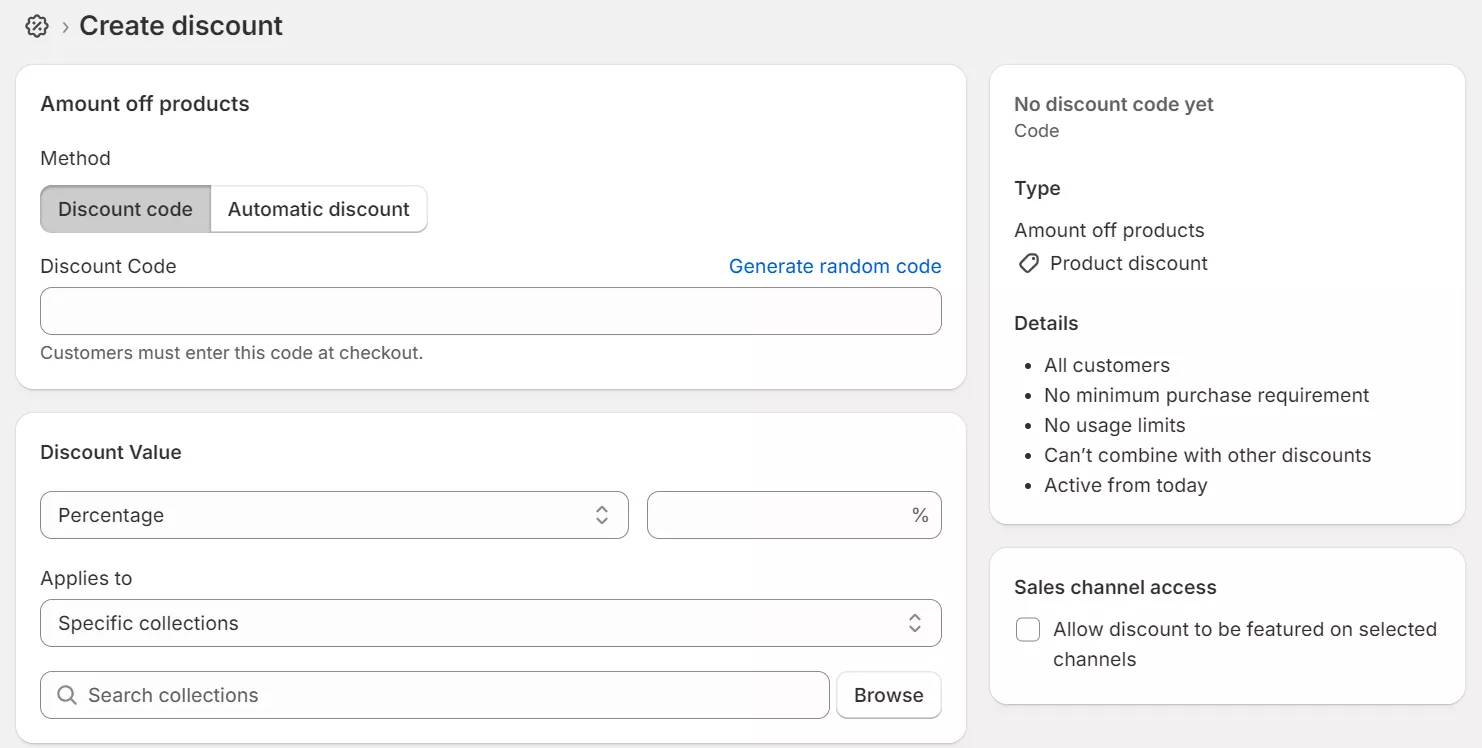
Step 3: Configure the discount value and method
Name your discount code something memorable, like “SUMMER20” or click Generate code for a random string. Under Discount value, enter either:
- A percentage (20% off)
- A fixed amount ($10 off)
- Free shipping conditions
Here’s an example of the random string:

For BOGO discounts, specify what customers buy and what they get free or discounted.
Step 4: Set application rules
Under Applies to, decide where your discount works:
- All products — sitewide discount
- Specific collections — select which product groups qualify
- Specific products — choose individual items
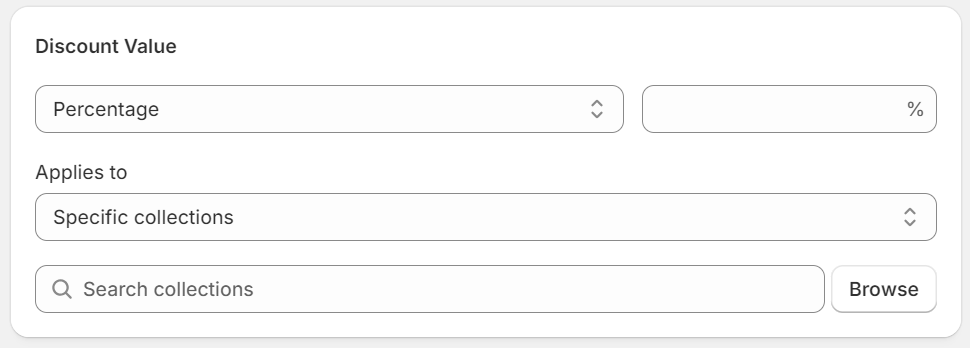
Add a Minimum purchase requirement if needed — either a dollar amount ($50 minimum) or item quantity (three items minimum):

Step 5: Define customer eligibility
The Customer eligibility section controls who can use your code:
- All customers — anyone can redeem
- Specific customer segments — target groups like “First-time buyers” or “VIP customers”
- Specific customers — hand-pick individual emails

Customer segments let you create targeted promotions without manual lists.
Step 6: Establish usage limits and active dates
Set boundaries to protect your margins:
- Limit number of times this discount can be used in total — cap overall redemptions
- Limit to one use per customer — prevent code sharing
- Combinations — choose if this code stacks with other discounts

Under Active dates, set your start date and optional end date:

Step 7: Save and review the discount
Hit Save, and your code goes live instantly. Test the code on your storefront before announcing it publicly — nothing kills a promotion faster than a broken discount.
Check that the minimum requirements work correctly and that the right products receive discounts. Your code now awaits customers at checkout.
Improve your Shopify coupon code strategy with Omnisend
Shopify’s native discount tools hit walls with advanced strategies — no customer segmentation, limited stacking options, and zero email automation. Omnisend bridges these gaps with powerful discount management and automations.
Why use Omnisend for Shopify discounts?
Native Shopify discounts work for basic promotions. But limitations appear quickly — no unique codes per customer, no automatic checkout application, and no tracking for email-generated sales. Managing discounts across campaigns and automations requires constant manual work.
Omnisend’s Discount Item changes this workflow. Drag and drop the element into your email. Codes are generated automatically. Everything manages itself within one platform instead of jumping between Shopify admin and your email tool.
Creating unique codes for campaigns and automations
Omnisend generates codes based on your Shopify email marketing activities:
- For campaigns: One code is created for all recipients. Everyone gets “SUMMER20” or similar, making campaign tracking straightforward. The code appears in Shopify under a parent discount entry, maintaining organized admin panels.
- For automations: Each person receives their single-use code. For instance, the first abandoner gets “ABC-123-4567,” and the next gets “DEF-789-0123” to prevent code sharing on deal sites. Turn on Reuse unique discount code to keep the same code across multiple workflow messages — useful for multi-step abandoned cart sequences.
You’ll see a standard XXX-XXX-XXXX code during setup. Your discount codes are generated at send time, appearing in Shopify with configured limits and expiration dates.
Here’s a screenshot showing the static discount element in Omnisend:
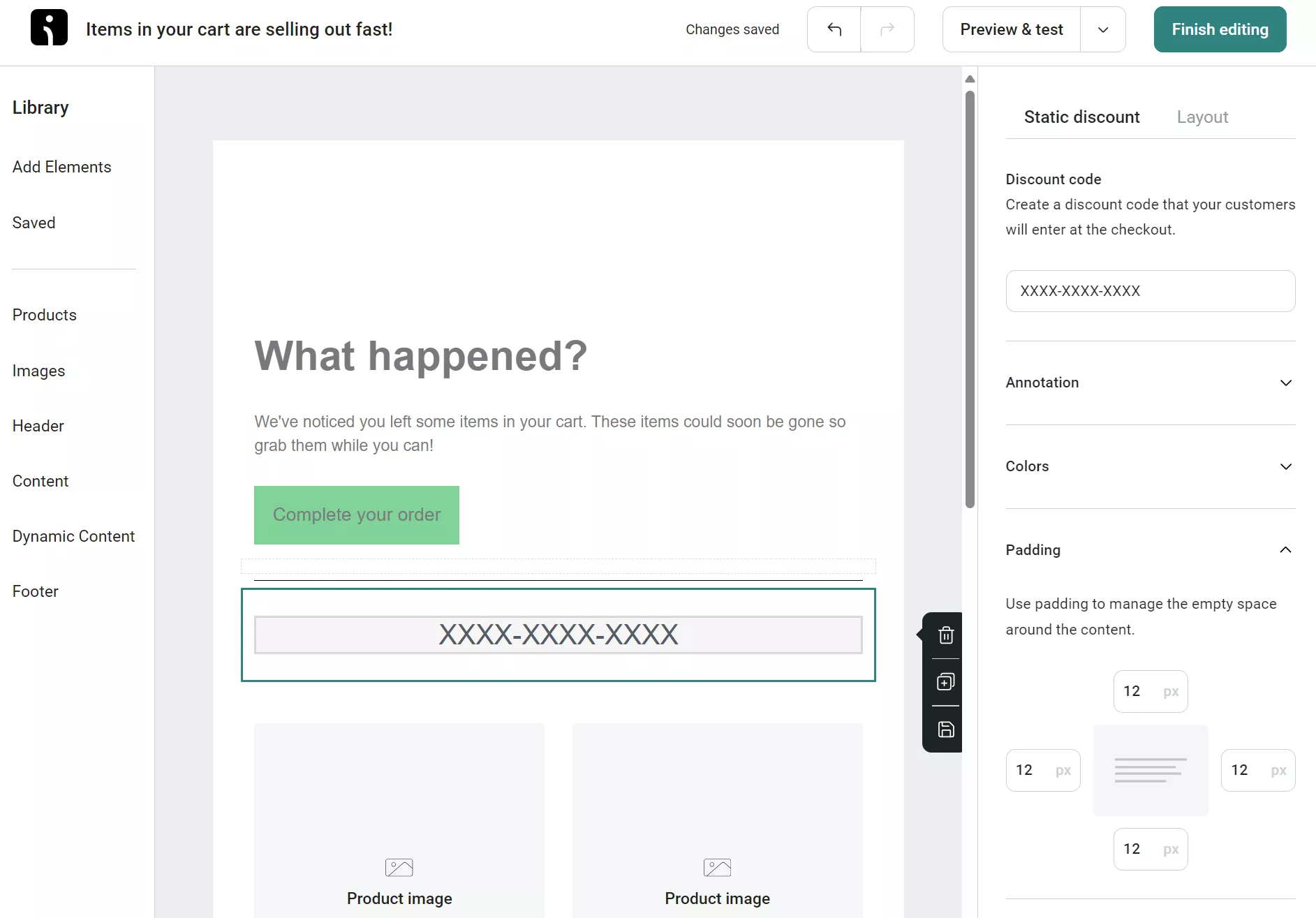
Helpful support articles to find out more:
Discount Item: Shopify and BigCommerce stores
Discount Item on different ecommerce platforms
The 1-click auto-apply discount: Omnisend vs. the competition
Applying automatic discounts with Omnisend is straightforward. Check one box — Apply Shopify discount link. That’s it. Customers click your email button, arrive at your store, and find the discount already applied at checkout.
No copying. No pasting. No lost sales from forgotten codes.
Other platforms handle this differently. Klaviyo requires manual URL construction like mysite.com/discount/{% coupon_code ‘SAVE20’ %} or building links with discount parameters.
You need to understand URL structure and templating syntax. Minor errors in formatting or parameters prevent discounts from applying.
Omnisend vs. Klaviyo discount setup
Here’s a comparison table showing Omnisend and Klaviyo’s approach to auto discounts:
| Feature | Omnisend | Klaviyo |
|---|---|---|
| Auto-apply method | Single checkbox | Manual URL construction with template tags |
| Setup complexity | Visual interface | Code-based approach |
| Technical knowledge | None required | URL structure and template syntax needed |
| Error prevention | Built-in validation | Manual syntax checking |
Stand out in the inbox with Gmail annotations
Gmail annotations display discount details directly in inbox previews, helping your promotional emails stand out before customers open them.
Configure the annotation settings once in Omnisend’s Discount Item — amount, expiration date, and code visibility. Every campaign recipient sees the promotion badge next to your subject line, increasing open rates in competitive inboxes.

Once you’ve configured your annotation, it will appear like this in your customers’ inbox:

Integration benefits beyond discounts
Omnisend connects directly with Shopify for complete data sync, including your historical orders, customer data, products, and more.
Order-triggered automations fire instantly based on purchase behavior, and Omnisend handles up to 25 automatic discounts (Shopify’s limit) efficiently. You can mix product, order, and shipping discounts within a single workflow.
Track performance across all discount types in unified reports, which show revenue per recipient, conversion rates, and discount usage patterns.
Omnisend removes the technical barriers between planning Shopify discount codes and executing them. Complex strategies become manageable when code generation, application, and tracking happen automatically.
Quick sign up | No credit card required
7 best practices for your Shopify coupon code promotions
1. Use unique codes for email & SMS campaigns
Generate individual codes for each recipient rather than sharing one static code. Coupon aggregator sites can’t distribute what they don’t have, protecting your margins.
Omnisend creates these dynamic discount codes for your automations and campaigns — no manual generation or tracking needed. Alternatively, you can create email campaigns with static coupons. Here’s an example email template with a coupon:
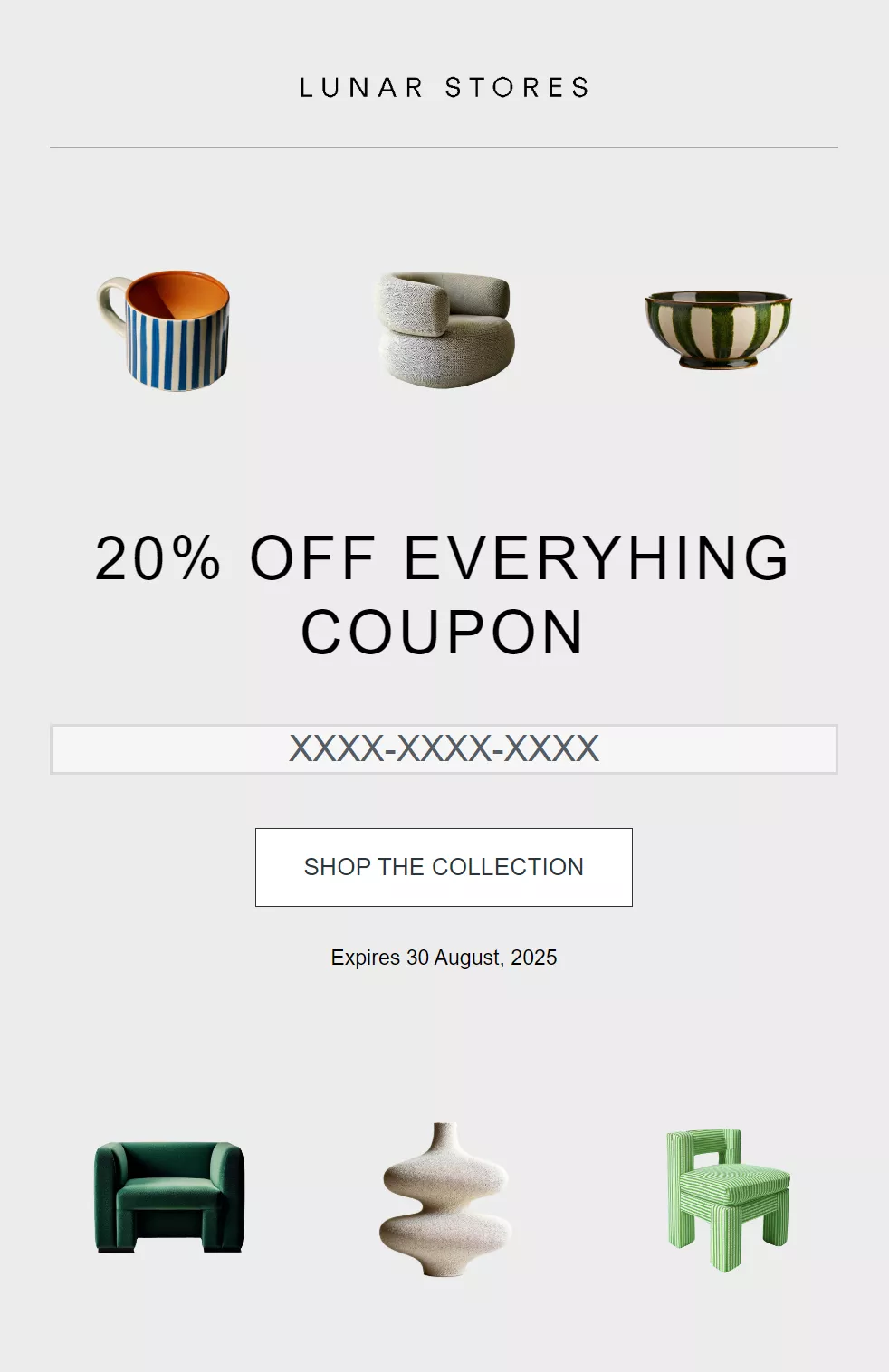
2. Create urgency with strategic expiry dates
Abandoned cart codes should expire within 48 hours to prompt quick decisions. Welcome series discounts can last seven to 14 days since new subscribers need time to explore your products. Win-back campaigns should be weekly.
Test different expiration windows with your customers, and let conversion data guide your timing strategy for each campaign type.
3. Make discounts easy to apply and share
Use auto-apply links so customers skip the copy-paste dance at checkout. Alternatively, provide your Shopify coupon code in a sitewide top banner, so it’s easily accessible, or add it to your cart to remind customers to apply the code.
Watch retailer MVMT has a top banner for its discount, and reminds customers of its “buy one, get one 50% off” coupon in red text in its slide-out cart:
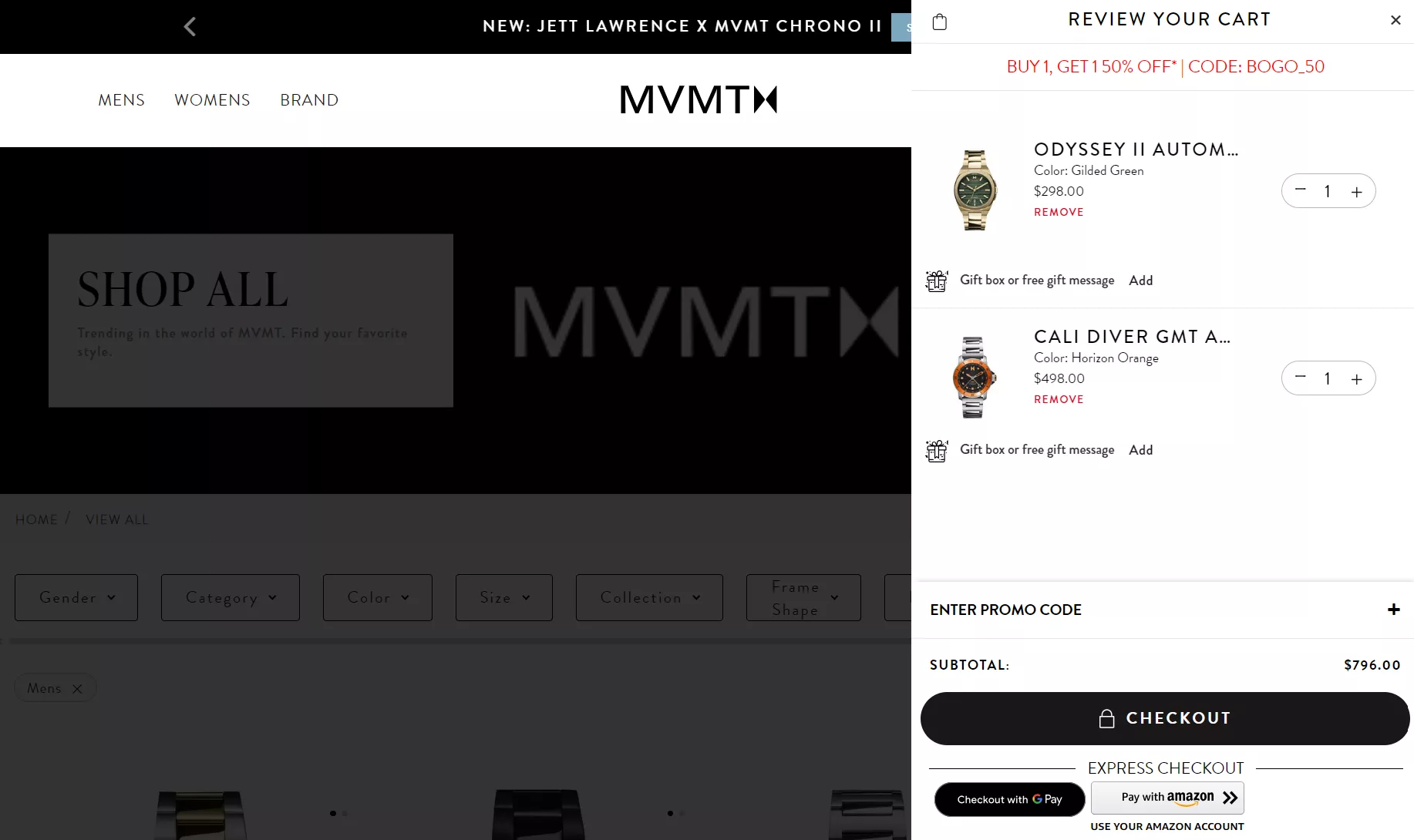
It’s also worth including social sharing buttons within your emails and throughout your site, and using unique links so that customers can copy and paste your sales.
Here’s an example from Nike with the code “3yaep”:

Satisfied customers become brand advocates when sharing is frictionless — track which channels generate the most redemptions and focus your future efforts there.
4. Segment offers by customer behavior
Segment your customers to prevent blasting everyone with the same 20% off forever. New customers might convert at 10%. Your dormant buyers need 25% to return. VIPs want early access, not deeper discounts.
Your Shopify email marketing tool, or coupon app, will tell you who needs what incentive. As a starting point, send a 10% discount to all subscribers, and see who bites. Those who click but don’t purchase might need a larger discount.
5. Display clear terms prominently
State minimum purchase requirements, product exclusions, and usage limits upfront for your coupon codes. “Free shipping on orders over $50” beats vague “Free shipping available.”
Place terms near your discount code for Shopify — not buried in footer text, and do the same within your email content.
6. Space promotions to maintain value
Weekly sales, promotions, and coupon codes will train your customers to never pay full price, destroying your brand’s premium positioning and sales.
It’s best practice to limit your biggest discounts to events, such as Black Friday, and use free shipping or bonus products to maintain engagement between significant sales periods without eroding perceived value.
7. Track performance beyond redemption rates
Measure revenue per email sent, not just coupon usage. Compare average order values between discount depths — if 10% off generates $200 orders and 30% off only produces $50 orders, stick with smaller discounts.
Check if discount users make repeat purchases at full price or only buy during sales. Omnisend has a pre-built segment for these customers (called “deal hunters”), letting you group subscribers who purchase during one of your sales.
Quick sign up | No credit card required
FAQs about Shopify coupon codes
Culprits include expired codes, exceeded usage limits, or unmet minimum purchase requirements, all of which you can verify in your Shopify admin — check expiration dates, usage restrictions, and which products or collections the code applies to.
Customers can use up to five product or order discount codes plus one shipping discount code per order. Combinations depend on discount classes — product discounts can combine with shipping discounts, but two codes for the same product won’t stack.
Yes, codes created in the Shopify admin work both online and at physical locations using Shopify POS. Cashiers enter codes during checkout or scan barcode versions. All discount rules and restrictions apply equally across channels.
Create a welcome automation in Omnisend with a discount element. It generates individual codes for each new subscriber, adds them to welcome emails automatically, and tracks usage — eliminating manual code management.
TABLE OF CONTENTS
TABLE OF CONTENTS


No fluff, no spam, no corporate filler. Just a friendly letter, twice a month.

 OFFER
OFFER







